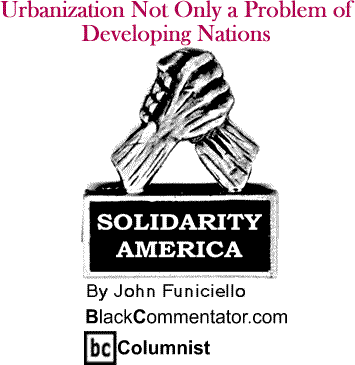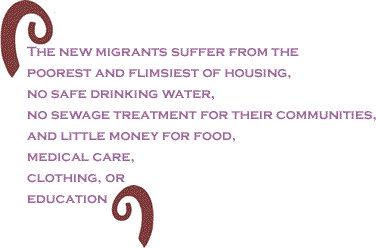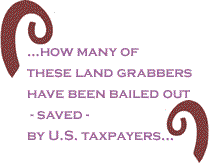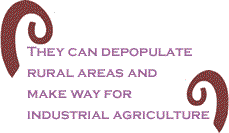
|
|||||||||||||||||||||||

|
|

Custom Search
|
|
 |
|
Historically, hunger, mass migration, and joblessness have been a problem throughout the developing world. Scholars, macro-economists, and international development experts have recognized the problem and speculated what might be done to solve the complex issue, but one of the root causes has not received much attention by the peoples of the “developed” nations: rural peoples being driven off the land and into the cities - more accurately, driven to the fringes of the cities. In the new places where the immigrants land there are ills that they never anticipated when they left their rural homes. Living is not easy. There are few jobs readily available in the cities for those whose skills emanate from a culture that takes its sustenance directly from the land. Such skills they possess are not needed in the city and are not easily transferred to a life lived in or around a big city. The new migrants suffer from the poorest and flimsiest of housing, no safe drinking water, no sewage treatment for their communities, and little money for food, medical care, clothing, or education. Together, these problems have become a crisis for the world’s poor. One of the reasons they are driven from the countryside is government policy that favors larger and larger agricultural operations, instead of small farms and small plots of cultivated land, on which rural economies have been based for the millennia. And one of the major reasons for such government action is the promise of development assistance from industrialized-nations’ governments and the transnational corporations that act under their protection. When poor nations borrow money, say, from the International Monetary Fund or the World Bank, they have to pay it back and they have been convinced that an easy way to do that is to convert peasant and indigenous agriculture to industrial agriculture, as in the U.S., Canada, and other western countries. Around the world, the displacement of peasant and pastoral peoples has resulted in the current crisis of malnutrition, hunger, and the constant threat of famine. War, corruption, and lack of education contribute their share to the problems.
As in other times, the “army of the unemployed,” made up of people desperate for work, tended to drive down wages and depress any impulse workers might have to form unions to better their living standards. This has continued into the 21st Century. In the current worldwide financial crisis, there’s a new twist to wresting even more farm land from the developing world, but this time it’s for more directly selfish reasons. GRAIN, an international non-governmental organization (NGO), which operates in nine countries on five continents, has just completed a report on what is being called a “land grab” by countries with money to spend. Countries are buying farm land in less-developed nations, where corporations can grow food for export back home. In return, according to GRAIN, the richer nations are offering infrastructure projects, development funds, oil contract, or loans.
A
few identified by GRAIN as “land grabbers” include Goldman Sachs,
Morgan Stanley, BlackRock, Louis Dreyfus, “but there are plenty
of others,” the report says. The question now is how many of these
land grabbers have been bailed out - saved - by Those who are going to poor countries with fistfuls of dollars are getting help from the usual suspects: agencies like The World Bank and its International Finance Corporation, as well as the European Bank for Reconstruction and Development. All of this is being done to make it easier to do what has been done in the developing world for decades - bend the people and their governments to the will of international corporate power. It was wrong for transnational corporations to effectively change economic and political systems - even cultures - in other countries, just to try to make them more like western societies and, more to the point, to make untold profits in the process. It’s just as wrong today for countries and their corporations to buy up precious farm land in poor countries, to feed people in countries that are well-off economically (at least the elites are), while the people in the target countries are cut off from their means to live and to feed themselves. It’s
a stroke of genius that corporations can aim for control over people
- in the As long as that kind of control is expressed throughout the world and people are subjects, there will not be prosperity in any country, no matter how deeply into taxpayers’ purses governments reach to bail out the ever-increasingly powerful corporations. BlackCommentator.com Columnist, John Funiciello, is a labor organizer
and former union organizer. His union work started when he
became a local president of The Newspaper Guild in the early 1970s.
He was a reporter for 14 years for newspapers in |
|
Any BlackCommentator.com article may be re-printed so long as it is re-printed in its entirety and full credit given to the author and www.BlackCommentator.com. If the re-print is on the Internet we additionally request a link back to the original piece on our Website. Your comments are always welcome. eMail re-print notice
If you send us an eMail message we may publish all or part of it, unless you tell us it is not for publication. You may also request that we withhold your name. Thank you very much for your readership. |
|
| |
|
| October 30, 2008 Issue 297 |
|
| Executive Editor: Bill Fletcher, Jr. |
| Managing Editor: Nancy Littlefield |
| Publisher: Peter Gamble |
| Est. April 5, 2002 |
Printer Friendly Version
in resizeable plain
text format or pdf
format. |
| Frequently Asked Questions |
 |

|
 |
 |
 |
| |
| |






























 The
masses of humanity gathered in the cities and urban areas, in general,
provide a constant supply of people who will do any work at the
lowest wage, and that supply of workers tends to drive down the
incomes of all wage workers, up and down the pay scale. During the
1980s, when strike-breaking and union-busting were at a peak in
the
The
masses of humanity gathered in the cities and urban areas, in general,
provide a constant supply of people who will do any work at the
lowest wage, and that supply of workers tends to drive down the
incomes of all wage workers, up and down the pay scale. During the
1980s, when strike-breaking and union-busting were at a peak in
the 
 “The
food-hungry land grabbers include
“The
food-hungry land grabbers include 




